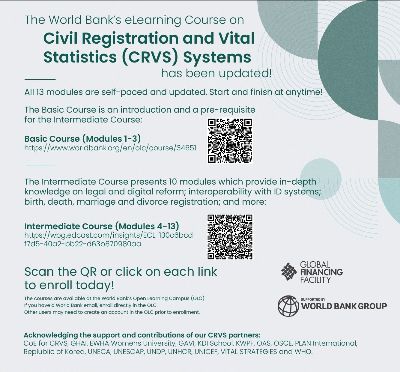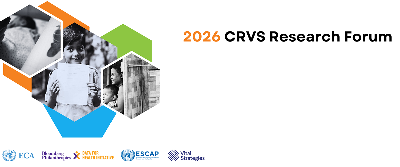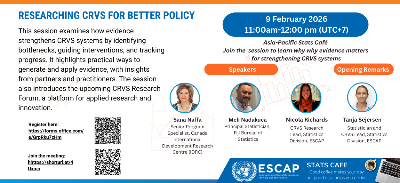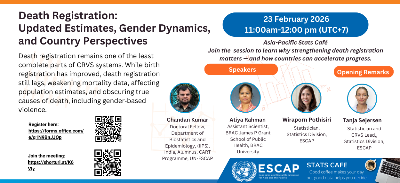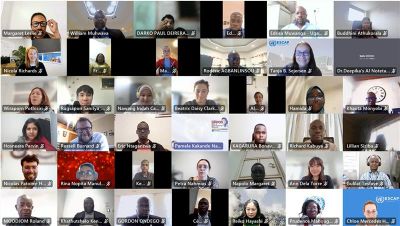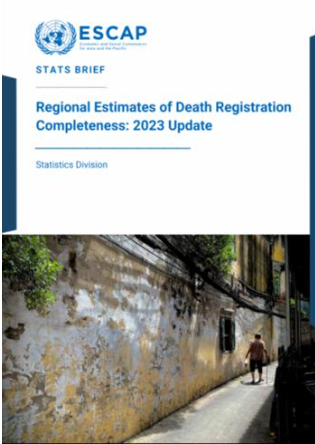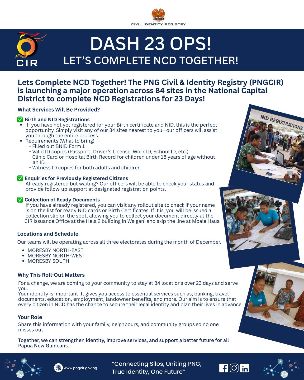Newsletter February 2024
Our community newsletter puts a spotlight on people who have gone above and beyond in their efforts to support CRVS programmes in Asia and the Pacific, raise awareness of CRVS issues or lead CRVS improvement efforts in their home country or in the region. This month, we would like to dedicate this issue of Insight to Romain Santon.
What is your current title and role?
I am presently working at Vital Strategies, a global non-for-profit public health organisation, as the Regional Deputy Director, CRVS Improvement Program for the Asia and Pacific Region. I have been leading the implementation and technical assistance of a wide range of CRVS-focused activities under the Bloomberg Philanthropies Data for Health (D4H) Initiative in the region since 2016, collaborating with senior government officials and development partners in countries such as, Bangladesh, Cambodia, China, Indonesia, Sri Lanka, Thailand and Vietnam, as well as Papua New Guinea, Solomon Islands and Pakistan.
I have lived and worked in Southeast Asia for almost 16 years, implementing programs on public health, HIV/AIDS, malnutrition and post-disaster response, previously working with a humanitarian organization with the mission to provide medical, nutritional and social aid to children, vulnerable populations and their families affected by disasters or crisis.
Can you please share with us a particular experience which highlighted the importance of CRVS to you?
When I first started working in this field 8 years ago, I barely knew what the “CRVS” acronym stood for. Coming from a country where it is a given to have a legal identity and access all the rights and services that come with it, I didn’t fully realise how privileged I was regarding what seemed to be so “basic” to me. I was appalled to discover that countless individuals live and die without any official proof of their existence and to realise that this scandal of invisibility, driven by the absence of reliable data on births, deaths, and their causes, leaves the poorest and most at-risk unseen and uncounted. It is only after getting directly involved in CRVS improvement work that I grasped the full scope of the issue, understanding the linkages between CRVS and legal identity, and that without it, people face other barriers throughout their lives, such as difficulties accessing education or health care, getting married, or finding official work. Having witnessed some of these challenges and inequities first hand in my previous post, working with underprivileged children mainly, whose unregistered births may be at higher risk of marginalization, discrimination, abuse, and associated risks, including child marriage, child labour, forced recruitment and trafficking, I could only relate and be convinced of how critical, essential and urgent improving CRVS systems was. I nowadays grab every single opportunity I have to spread the word and therefore sincerely believe that everyone who is aware of this issue and involved in this work should proactively and systematically advocate and educate government stakeholders, general population, development partners and donors about the central and essential role of robust CRVS systems so that, in an ideal near future, no one is denied essential rights and protections that come with a legal identity.
How are you currently involved in CRVS improvements?
In my current role at Vital Strategies, I lead the Asia and Pacific regional team’s Civil Registration and Vital Statistics portfolio, providing strategic and technical assistance under the umbrella of the Bloomberg Philanthropies Data for Health Initiative. I am, alongside with my team and other international development partners, assisting these countries to strengthen their CRVS systems via streamlining birth and death notification processes, improving the connections between the health sector and the civil registry, as well as improving the quality of cause of death ascertainment and reporting, at both facility and community levels—critical information in understanding a country’s health trends. I also coordinate with regional bodies and international partners such as UNESCAP and the Pacific Community and support regional level activities, such as the various sub-national networks of Civil Registrars for instance. Over the past years, my career has brought me into United Nations meeting rooms, national ministries, municipal headquarters and face to face with local community members. Being able to engage at the global, regional and national levels, from grassroot level to countries’ highest authorities and leadership has been particularly eye opening to understand both challenges and best practices at every level and guide stakeholders in their endeavours to strengthen and streamline CRVS systems.
Which advice would you give to others trying to improve CRVS systems?
Firstly, to succeed in this field, I believe partnerships and collaborations are paramount. Given the multi-sectoral and complex nature of CRVS systems, their ramifications to ID, social protections and other essential services, and the wide array of stakeholders involved, ranging from various ministries at the national level, to sub-national authorities in some cases, but also local, regional, and global development partners, approaching CRVS improvements efforts in silo would be set for failure. Ensuring the engagement and consultation of all stakeholders and creating platforms for collaboration and best practices sharing, in-country and between countries have proven central to achieving sustained improvements.
Then, at the country level, identifying CRVS champions who can engage in bold leadership and cross-sectoral coordination activities among government stakeholders, and providing them with the necessary capacity, tools and resources to succeed can accelerate and enhance CRVS improvement efforts in a well-coordinated and sustainable manner.
Finally, continuously engaging in advocacy activities at various levels, to raise awareness about what the shortcomings of CRVS systems can lead to and the central role these systems play in ensuring legal identity for all, improving universal access to services, service deliveries and evidence-based policy decisions.




